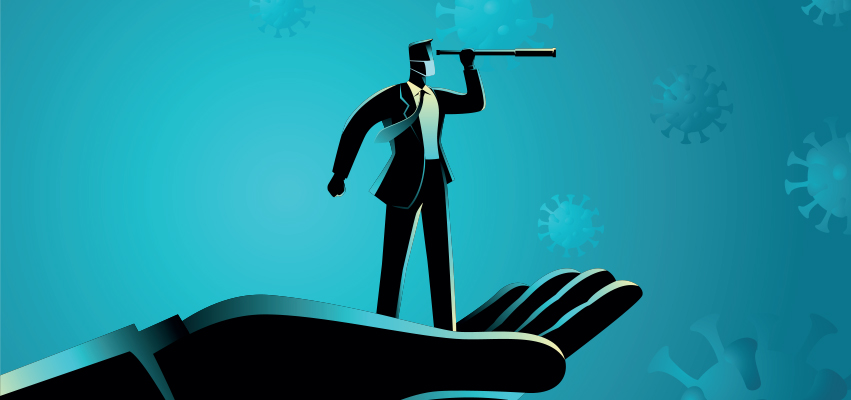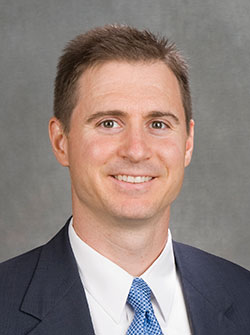Econ Corner: An Interview with Dr. Joshua Lewer Chairman

Welcome back to Peoria Magazine's Econ Corner, a recurring feature in which we pose questions to experts about various economic issues and how they affect our lives and careers here in central Illinois. Dr. Joshua Lewer, Chairman of the Department of Economics and McCord Professor of Executive Management Development at Bradley University, returns to provide this month's analysis.

Peoria Magazine (PM): A recent New York Times story posed the question, "Is America's economy entering a new normal?" After a quarter century of rock-bottom interest rates, low inflation and wage stagnation, all of the above are now heading in the opposite direction. So how would you answer that question?
Dr. Lewer: First let me say that with technological progress and market-based competitive forces at work, our economy is always moving to a new state of normalcy. But what is distinctively unique during this contemporary period is the elevated and persistent inflation pressures the average American household is now facing.
What Americans are experiencing now is the negative effects from negative real returns.
Let me explain. On interest rates, the nominal yield on the 10-year bond has risen from 1.5 percent at the end of 2021 to 2.5 percent at the start of April 2022. That is a huge move for bonds in a short period of time. But with inflation running at 7.9 percent, the real return is negative 5.4 percent. Similarly, according to the Bureau of Labor Statistics' most recent jobs report, average hourly earnings are at an all-time record high of $31.73. This is up from $30.06 per hour in March 2021, or a whopping 5.6 percent. But, this 5.6 percent gain doesn't feel like a gain because purchasing power has declined by 2.3 percent.
The inflation tax, coupled with other uncertainties, has caused America's confidence to falter. The best-known measure of Americans' perceptions about the future is the University of Michigan's Consumer Sentiment Index. It now stands at decade-low levels.
When consumers expect a bleak future, they cut back on spending, thus lowering Gross Domestic Product (GDP). If, on the other hand, U.S. households are optimistic about the future, they feel comfortable spending and investing, causing a positive feedback loop for the economy and the equity markets. I don't expect consumer sentiment to improve much until we see some semblance of price stability.
PM: Some have likened the combination of the pandemic/war in Ukraine and their attendant side effects to the Great Recession of 2008, the rampant inflation of the 1970s and even the Great Depression of the 1930s in terms of their potential impact on economic behaviors. What's your take? Do you see consumer behaviors permanently changing, and if so, how so? Should Americans now be saving more and buying less, for example?
Dr. Lewer: This is an important question for many reasons. Our economy is roughly 70 percent consumption-based, so changes in consumer behavior and sentiment are closely followed because they are critical to short-run GDP performance. While we have to wait a little bit longer for additional aggregate demand data to come in, initial trends suggest that American consumption and saving patterns aren't changing. In fact, after the COVID-19 lockdown spike, personal savings rates stand at 6.3 percent, below pre-pandemic levels.
American hyper-consumerism has its pros and cons. For example, Gordon Brown and John Gathergood's (2020) article entitled "Consumption Changes, Not Income Changes, Predict Changes in Subjective Well-Being" finds that consumption, ”and in particular conspicuous consumption,” significantly enhances subjective happiness.
On the other hand, most economists would agree that we are below the optimal (or Golden Rule) rate of savings, and that a systemic increase in savings would result in greater physical investment and worker productivity. Harvard economist Philippe Aghion co-authored a piece entitled "When Does Domestic Saving Matter for Economic Growth" which finds that savings is associated with faster economic growth through its positive impact on capital accumulation and innovation for all countries, but especially developing ones.
Lastly, I would encourage readers to go to my "The Enlightened Investor" YouTube channel, where we discuss the importance of saving and investing. The American public experiences a great deal of anxiety and stress due to their financial situation. In fact, The Employment Benefit Research Institute's "2021 Retirement Confidence Survey" reports that more than half of American workers say their debt level is a problem.
And while Americans are feeling more confident about having enough money for retirement due to the housing and equity market boom, the average person is retiring earlier than expected due to COVID or structural changes at work. For example, only 46 percent of American workers expect to retire before the age of 66, but statistics indicate that 74 percent of workers do retire before 66. With less time spent earning income, there is a heightened urgency for Americans to save as much as they can, while they can!
PM: What's your view of the Fed's interest rate increases as a corrective action for inflation, relative to other possible remedies? Can you give us a primer on what assumptions are in play behind such moves? What might some of the unintended consequences be?
Dr. Lewer: The Federal Reserve has been wrong about the duration and magnitude of inflation pressures. While there are economic headwinds and Grey Swan events like the war in Ukraine to consider, the number one priority for the Federal Reserve should be to restore price-stability credibility so that inflation expectations don't become unanchored.
Unfortunately for everyone, inflation fighting is a nasty business. Contractionary monetary policies are blunt and dampen both aggregate demand and aggregate production. Today, Bridgewater Associates founder and co-chief investment officer Ray Dalio states, "We're going to have a period of stagflation." Stagflation is a period of time of weak economic growth coupled with rising inflation and interest rates. This is a possible outcome.
Notably, the Federal Reserve did provide some guidance with its "Dot Plot" forecast released in March indicating that they expect to raise Federal Funds interest rates from their current 0.25 percent range up to 1.75 percent or 2 percent by the end of the year. Longer-term rates like the 30-year fixed mortgage have already responded, shooting up from 3.1 percent at the end of 2021 to 4.7 percent in early April 2022. Look for rates to continue moving up as the Federal Reserve implements its plan. Housing and other sectors will feel the pinch.
That being said, I am hoping for inflation to reach an inflection point later this summer and slowly work its way down. With all the monetary stimulus associated with the pandemic, coupled with persistent supply/labor constraints, a quick end to our inflation problem is unlikely.
In the meantime, what should investors do? The key is to stick to your plan. Remain vigilant and focused on your long-run financial objectives. Elevated inflation periods such as these, while worrisome, are just noise over the long-run investing horizon of individual investors.

